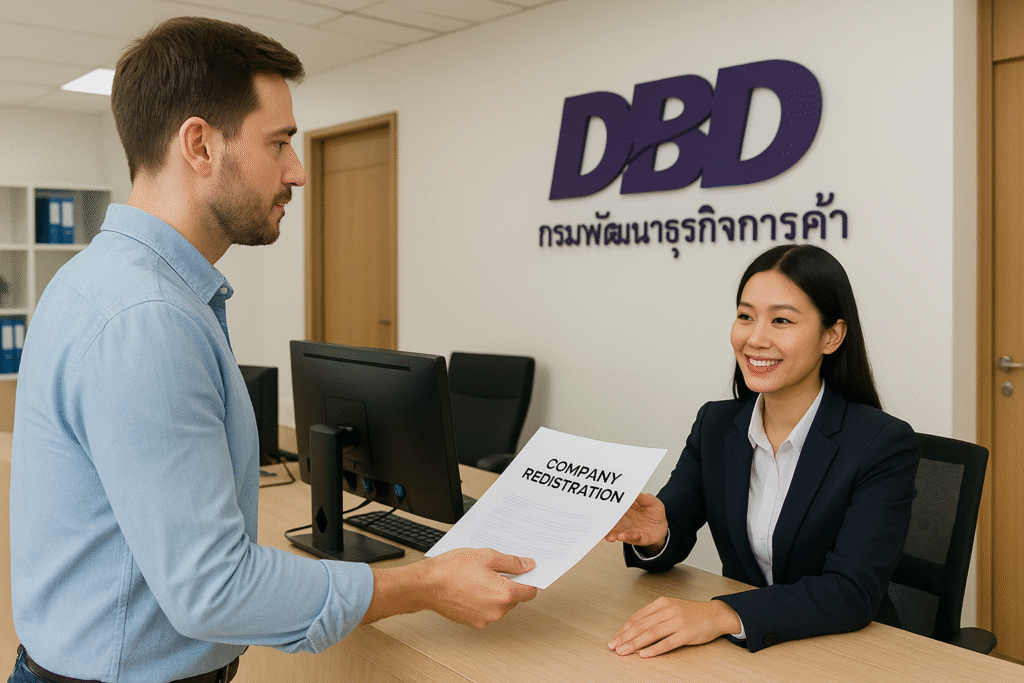Thinking about registering a company in Thailand? Whether you’re an entrepreneur testing a new market or a corporation expanding into Southeast Asia, setting up a Thai entity gives you a legal presence to hire, invoice, and build partnerships confidently. It also shapes how you handle licenses, taxes, and immigration for foreign staff.
Operating through a limited company protects personal assets and can create cleaner tax treatment for business income compared to running as an individual. In practice, suppliers, banks, and investors also view incorporated entities as more credible and easier to onboard.
This guide gives you what to prepare, how the DBD process works, what happens after incorporation, how foreign ownership is regulated under the FBA/FBL, and when BOI promotion is worth exploring.
Who should be registering a company in Thailand?
If you plan to sell or deliver services in Thailand, setting up a Thai company is usually the right starting point. It allows you to sign contracts in-country, open bank accounts, issue tax invoices, and build a team under Thai law. That’s difficult to replicate as an individual.
Foreign entrepreneurs benefit from clearer separation between personal and business liabilities. The company becomes the legal vehicle for operations, which reduces risk and simplifies compliance over time. It also prepares you for investor conversations since equity can be allocated and transferred through shares.
If you’re an overseas company entering Thailand, a local entity supports customer acquisition and service delivery. There are alternatives branch and representative offices but each has its own scope and limits. We’ll cover those options separately so you can choose the right fit.
Requirements for registering a company in Thailand
Before drafting forms, align on three essentials: promoters, share structure, and registered address. These shape your file with the Department of Business Development (DBD) and influence banking and licensing downstream.
1) Promoters
At least two individuals (Thai or foreign) are required to establish a limited company. They act as promoters and initial shareholders. After incorporation, the company must maintain at least two shareholders at all times.
2) Shares and capital requirements
The par value per share must be at least THB 5. There’s no statutory minimum number of shares, and you can technically start with low registered capital, but most founders choose a credible level. For future investors, pick a low par value and a higher number of shares to make allotments and transfers simpler.
3) Registered address
Provide a Thai address that permits company registration (office, commercial unit, or qualified virtual office). The address determines where certain filings occur and where official correspondence is sent. Choose a location convenient for liaison with authorities and your core operations.
Thailand company registration process (DBD)
The Department of Business Development is your primary counterpart. You can register in person at the DBD office that covers your address or use the online platform. Foreign signers typically complete identity verification before using the digital route.
A smooth filing hinges on accurate forms and consistent details across names, addresses, share structure, and director authorities. Draft carefully, small inconsistencies can cause avoidable delays or extra office visits.
Timelines are generally short once documents are in order. The longest lead times usually involve identity checks, notarization/legalization of foreign documents, and bank onboarding.

Step 1: Reserve a company name
Submit your preferred names through the DBD system. The name can be in a foreign language but must include a Thai transliteration. Avoid names that are identical or confusingly similar to existing entities. When approved, the reservation has an expiry—finish registration before it lapses.
Step 2: Fill out the incorporation forms
Forms cover promoters, directors, directors’ powers, shareholdings, registered capital, objectives, registered address (with map), and other particulars. The workflow is in Thai and follows specific drafting conventions. Many founders use professional assistance to reduce back-and-forth.
Step 3: File the registration documents
Arrive with complete forms and supporting documents (some DBD offices require an online queue booking). If the file is acceptable, officers will register the company and issue the company registration certificate. Your entity can then operate and proceed to post-incorporation steps.
Related registrations after incorporation
Once incorporated, you’ll handle a short sequence of tax and payroll tasks. Getting these right early avoids penalties, protects cash flow, and keeps vendor payments smooth.
Start with your corporate tax ID, then confirm if and when VAT registration applies to your model. As you hire, register with the Social Security Office and set up payroll processes that meet statutory requirements.
Banks vary widely on onboarding requirements and timelines. Align your director signing authority, board resolutions, and specimen signatures to match the bank’s templates so the account opens on first pass.
1) Company bank account
Confirm KYC, board resolution wording, and signatory rules with your chosen bank. Prepare minutes and Articles to match the bank’s checklist.
2) Corporate income tax registration
Apply for your corporate tax ID with the Revenue Department generally within 60 days of incorporation (or business commencement for certain foreign entities).
3) VAT registration
Register when annual taxable turnover exceeds THB 1.8 million. Some firms register earlier (e.g., B2B input VAT recovery). Once registered, charge VAT where applicable and file monthly returns.
4) Social Security
Within 30 days of hiring your first employee, register as an employer with the Social Security Office and follow monthly contribution rules.
Foreign ownership in Thailand: the Foreign Business Act (FBA) and Foreign Business License (FBL)
Thailand treats a company as “foreign” when 50% or more of its shares are owned by foreign individuals or entities. Foreign-owned companies face activity restrictions unless exempted or licensed. Understanding this early prevents costly restructures.
The FBA organizes activities into three lists. List 1 is prohibited to foreign-owned companies. Lists 2 and 3 are restricted but may be allowed with permission. Many service businesses fall under List 3 and require a Foreign Business License (FBL) if no exemption applies.
Capital thresholds also matter. As a guide, foreign businesses typically need at least THB 2 million in capital, rising to THB 3 million per restricted activity or 25% of three years’ expenses, whichever is higher for licensed activities. Plan capital to meet both licensing and hiring needs.

Thailand BOI promotion
The Board of Investment (BOI) promotion is designed to attract strategic investments in targeted industries. For qualifying activities, it can unlock tax incentives and non-tax benefits that reduce operating friction and improve your recruitment plan for foreign experts.
The most cited benefits include import-duty relief on machinery and raw materials, corporate income tax holidays or reductions, and streamlined visa/work permit processes. For some projects, majority foreign ownership is also possible.
BOI is not for everyone. Check whether your business activity code fits the promoted list, whether your investment plan meets thresholds, and whether the long-term benefits outweigh the application and compliance obligations.
Ready to Register? Here’s How We Can Help
A Thailand company set up gives you a legal base to hire, invoice, and grow while separating personal and business risk. The key is a clean incorporation, disciplined follow-ups on tax/VAT/SSO, and early clarity on FBA/FBL or BOI paths.
If you want to focus on customers and revenue, we can take the legal lift. SVBL handles company registration, licenses, liaison with authorities, day-to-day compliance, contract drafting and review, and visa solutions for foreign staff.
Contact us today and tell us where you are in the process, your activity plan, and your ownership split. We’ll recommend the right route and get you operational properly and on time.


